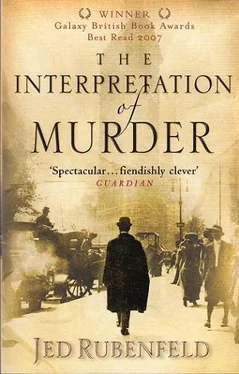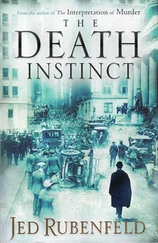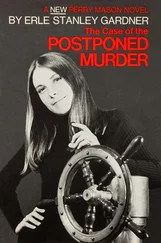Jed Rubenfeld - The Interpretation of Murder
Здесь есть возможность читать онлайн «Jed Rubenfeld - The Interpretation of Murder» весь текст электронной книги совершенно бесплатно (целиком полную версию без сокращений). В некоторых случаях можно слушать аудио, скачать через торрент в формате fb2 и присутствует краткое содержание. Жанр: Исторические приключения, на английском языке. Описание произведения, (предисловие) а так же отзывы посетителей доступны на портале библиотеки ЛибКат.
- Название:The Interpretation of Murder
- Автор:
- Жанр:
- Год:неизвестен
- ISBN:нет данных
- Рейтинг книги:5 / 5. Голосов: 1
-
Избранное:Добавить в избранное
- Отзывы:
-
Ваша оценка:
- 100
- 1
- 2
- 3
- 4
- 5
The Interpretation of Murder: краткое содержание, описание и аннотация
Предлагаем к чтению аннотацию, описание, краткое содержание или предисловие (зависит от того, что написал сам автор книги «The Interpretation of Murder»). Если вы не нашли необходимую информацию о книге — напишите в комментариях, мы постараемся отыскать её.
The Interpretation of Murder — читать онлайн бесплатно полную книгу (весь текст) целиком
Ниже представлен текст книги, разбитый по страницам. Система сохранения места последней прочитанной страницы, позволяет с удобством читать онлайн бесплатно книгу «The Interpretation of Murder», без необходимости каждый раз заново искать на чём Вы остановились. Поставьте закладку, и сможете в любой момент перейти на страницу, на которой закончили чтение.
Интервал:
Закладка:
'Did you render an opinion about Thaw's coming into New York last weekend?' asked Littlemore.
'Was Mr Thaw in New York last weekend?' replied Dana.
'Jelliffe says it was your decision.'
'I am not Mr Thaw's physician, Detective. Jelliffe is. I severed my professional relationship with Mr Thaw last year, as public records will demonstrate. Dr Jelliffe has occasionally sought my counsel, and I have given him what advice I could. I know nothing of Jelliffe's ultimate treatment decisions, and I certainly could not be said to have made them.'
'Fair enough,' said Littlemore. 'I guess I could arrest you for conspiring in the escape of a state prisoner, but it sounds like I couldn't convict you.'
'I doubt it very much,' said Dana. 'But I could probably have you fired if you tried.'
'And I guess,' said Littlemore, 'you also couldn't have made any decisions about stealing a manuscript, burning it, and putting the ashes in the home of Dr Abraham Brill?'
For the first time, Dana appeared disconcerted.
'Nice ring you got there, Dr Dana,' Littlemore went on.
I hadn't noticed; on Dana's right hand there was a signet ring. No one spoke. Dana clasped his long fingers together — not, however, hiding the ring — and reclined in his chair. 'What do you want, Mr Littlemore?' he asked. He turned to me. 'Or perhaps I should ask you that question, Dr Younger.'
I cleared my throat. 'It's a tissue of lies,' I said. 'The accusations you have made against Dr Freud. Every single one of them is false.'
'Assume I know what you are talking about,' answered Dana. 'I ask you again: what do you want?'
'It's three-thirty,' I replied. 'In half an hour, I am going to wire G. Stanley Hall in Worcester. I am going to say that a certain story is not going to be published in the New York Times tomorrow. I want my telegram to be true.'
Dana sat in silence, holding my stare. 'Let me tell you something,' he said at last. 'The problem is this: our knowledge of the human brain is incomplete. We don't have medicines to change the way people think. To cure their delusions. To relieve their sexual desires while keeping them from overpopulating the world. To make them happy. It is all neurology, you know. It has to be. Psychoanalysis is going to set us back a hundred years. Its licentiousness will appeal to the masses. Its prurience will appeal to young scientific minds and even to some old ones. It will turn the masses into exhibitionists and physicians into mystics. But someday people will wake up to the fact that it is all the emperor's new clothes. We will discover drugs to change the way people think, sooner or later. To control the way they feel. The question is only whether, by then, we will still have enough of a sense of shame to be embarrassed by the fact that everyone is running around naked. Send your telegram, Dr Younger. It will be true — for now.'
After leaving Dana's house, Littlemore drove me across town. 'So, Doc,' he said, 'I know how you feel about Nora and all, but aren't you — I mean, why'd she do it?'
'For Clara,' I answered.
'But why?'
I didn't answer.
Littlemore shook his head. 'Everybody did everything for Clara.'
'She procured girls for Banwell,' I said.
'I know,' replied Littlemore.
'You know?'
'Last night,' he said, 'Nora was telling Betty and me about the work she and Clara did with the immigrant families downtown, and it didn't sound kosher to me, if you see what I mean, not after everything else I'd heard. So I got some names and addresses from Nora and ran them down this morning. I found a few of the families Clara had "helped." Most of them wouldn't talk, but I finally got the story. I'm telling you, it's ugly. Clara would find girls with no fathers, sometimes no parents at all. Real young girls — thirteen, fourteen, fifteen. She'd pay off whoever was taking care of them and take them to Banwell.'
Littlemore drove on without speaking.
'Did you find out,' I asked, 'how the passage into Nora's bedroom got there?'
'Yup. Banwell gave us his story today too,' said the detective. 'He blames the whole thing on Clara. He never suspected she was against him — not until yesterday. Three or four years ago, the Actons hired him to rebuild their house at Gramercy Park. That's when they met.'
'And Banwell became obsessed with Nora,' I said.
'Looks like it. She's — what, fourteen at the time, but he's got to have her. So get this: his boys are working on the house, and they find this old passage running from one of the second-floor rooms to the garden shed out back. Apparently the Actons didn't know it was there. But they're out of town, and Banwell never lets on. He has the passage fixed up so he can enter it from the back alley without ever going onto the Actons' property. And he designs the house so the room on the second floor becomes Nora's new bedroom. I asked him if his plan was just to go to Nora's bedroom one night and rape her. You know what? He laughed in my face. According to him, he never raped anybody. They all wanted it. With Nora, he figures he's going to seduce her, and he needs a way in and out of her room without her parents knowing about it. But I guess Nora didn't go for the seduction.'
'She rejected him,' I said.
'That's what he told us. He swears he never touched her. Never used the secret passage until this week. You know, I think it really upset him. Maybe no girl ever turned him down before.'
'Could be,' I said. 'Maybe he was in love with her.'
'You think so?'
'I think so. And Clara decided to get Nora for him.'
'How would she do that?' asked Littlemore.
'I think she tried to make Nora fall in love with her.'
'What?' he said.
I didn't respond.
'I don't know about that,' Littlemore went on, 'but I'll give you this much: Banwell says getting Nora to play Elizabeth Riverford was Clara's idea. When he builds the Balmoral, he lays down another passage, only this time connected to his own study. The apartment it goes to is going to be his bird's nest. He sets it up just the way he wants it: big brass bed, silk sheets, the works. Fills the closet with lingerie and furs. Puts a couple of his own suits there, too, in a different closet he keeps locked. A little while ago, if you can believe Banwell, Clara tells him Nora has finally said yes. The idea is that Nora's going to rent the apartment under a false name, and she's going to come up to see him whenever she can. I don't know what the truth is there. I didn't want to ask Nora about it.'
I knew. Nora had told me the whole story last night, while we waited for the police.
One day in July, Clara tearfully told Nora that she could no longer bear her marriage. George flogged and raped her almost every night. She feared for her life but couldn't leave him, because he would kill her if she did.
Nora was horrified, but Clara said there was nothing anyone could do. Only one thing could save her, but it was impossible. Clara knew a man highly placed in the police force: Hugel, obviously; Clara had met him when she and Nora were 'helping' an immigrant family whose daughter had died. According to Clara, she revealed her plight to him. Hugel took pity on her but said the law was powerless, because a husband had a legal right to rape his wife. When, however, Clara added that George raped other girls too — whose families he paid off in exchange for their silence, and at least one of whom had been killed — the coroner had allegedly grown outraged. He supposedly decided there was only one thing to be done: they must stage a murder.
A girl must be found seemingly dead in the apartment that George kept for his mistresses. It must look like she died by his hand. It could be done, because he himself (the coroner) would administer the catalepsy-inducing drug and he himself would be the medical examiner. A piece of evidence left at the scene would identify Banwell as the perpetrator. Clara made Nora believe the entire scheme originated with the coroner.
Читать дальшеИнтервал:
Закладка:
Похожие книги на «The Interpretation of Murder»
Представляем Вашему вниманию похожие книги на «The Interpretation of Murder» списком для выбора. Мы отобрали схожую по названию и смыслу литературу в надежде предоставить читателям больше вариантов отыскать новые, интересные, ещё непрочитанные произведения.
Обсуждение, отзывы о книге «The Interpretation of Murder» и просто собственные мнения читателей. Оставьте ваши комментарии, напишите, что Вы думаете о произведении, его смысле или главных героях. Укажите что конкретно понравилось, а что нет, и почему Вы так считаете.












